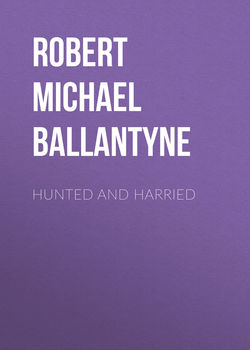Читать книгу Hunted and Harried - Robert Michael Ballantyne - Страница 4
Chapter Four.
The Hunting and Harrying Displayed
ОглавлениеBeing ignorant, as we have said, of the cruel murder of old Mitchell, Ramblin’ Peter’s report had not seriously alarmed Black. He concluded that the worst the troopers would do would be to rob the poor old couple of what money they found in their possession, oblige them to take the Oath of Supremacy, drink the health of King and bishops, and otherwise insult and plunder them. Knowing the Mitchells intimately, he had no fear that their opposition would invite severity. Being very fond of them, however, he resolved, at the risk of his life, to prevent as far as possible the threatened indignity and plunder.
“They’re a douce auld pair,” he remarked to Will Wallace as they strode down the hillside together, “quiet an’ peaceable, wi’ naething to speak o’ in the way of opeenions—somethin’ like mysel’—an’ willin’ to let-be for let-be. But since the country has been ower-run by thae Hielanders an’ sodgers, they’ve had little peace, and the auld man has gie’n them a heap o’ trouble, for he’s as deaf as a post. Peter says the pairty o’ dragoons is a sma’ ane, so I expect the sight o’ us’ll scare them away an’ prevent fechtin’.”
“It may be so,” said Wallace, “and of course I shall not fail you in this attempt to protect your old friends; but, to tell you the truth, I don’t quite like this readiness on the part of you Covenanters to defy the laws, however bad they may be, and to attack the King’s troops. The Bible, which you so often quote, inculcates longsuffering and patience.”
“Hm! there speaks yer ignorance,” returned the farmer with a dash of cynicism in his tone. “Hoo mony years, think ye, are folk to submit to tyranny an’ wrang an’ fierce oppression for nae sin whatever against the laws o’ God or the land? Are twunty, thretty, or forty years no’ enough to warrant oor claim to lang-sufferin’? Does submission to law-brekin’ on the pairt o’ Government, an’ lang-continued, high-handed oppression frae King, courtier, an’ prelate, accompanied wi’ barefaced plunder and murder—does that no’ justifiee oor claim to patience? To a’ this the Covenanters hae submitted for mony weary years withoot rebellion, except maybe in the metter o’ the Pentlands, when a wheen o’ us were driven to desperation. But I understand your feelin’s, lad, for I’m a man o’ peace by natur’, an’ would gladly submit to injustice to keep things quiet—if possable; but some things are no’ possable, an’ the Bible itsel’ says we’re to live peaceably wi’ a’ men only ‘as much as in us lies.’”
The ex-trooper was silent. Although ignorant of the full extent of maddening persecution to which not merely the Covenanters but the people of Scotland generally had been subjected, his own limited experience told him that there was much truth in what his companion said; still, like all loyal-hearted men, he shrank from the position of antagonism to Government.
“I agree with you,” he said, after a few minutes’ thought, “but I have been born, I suppose, with a profound respect for law and legally constituted authority.”
“Div ye think, lad,” returned Black, impressively, “that naebody’s been born wi’ a high respec’ for law but yersel’? I suppose ye admit that the King is bound to respec’ the law as weel as the people?”
“Of course I do. I am no advocate of despotism.”
“Weel then,” continued the farmer with energy, “in the year saxteen forty-ane, an’ at ither times, kings an’ parliaments hae stamped the Covenants o’ Scotland as bein’ pairt o’ the law o’ this land—whereby freedom o’ conscience an’ Presbyterian worship are secured to us a’. An’ here comes Chairles the Second an’ breks the law by sendin’ that scoondrel the Duke o’ Lauderdale here wi’ full poors to dae what he likes—an’ Middleton, a man wi’ nae heart an’ less conscience, that was raised up frae naething to be a noble, nae less! My word, nobles are easy made, but they’re no’ sae easy unmade! An’ this Lauderdale maks a cooncil wi’ Airchbishop Sherp—a traiter and a turncoat—an’ a wheen mair like himsel’, and they send sodgers oot ower the land to eat us up an’ cram Prelacy doon oor throats, an’ curates into oor poo’pits whether we wull or no’. An’ that though Chairles himsel’ signed the Covenant at the time he was crooned! Ca’ ye that law or legally constituted authority?”
Although deeply excited by this brief recital of his country’s wrongs, Black maintained the quiet expression of feature and tone of voice that were habitual to him. Further converse on the subject was interrupted by their arrival at the farm, where they found all right save that Jean and Aggie were in a state of tearful anxiety about their poor neighbours.
